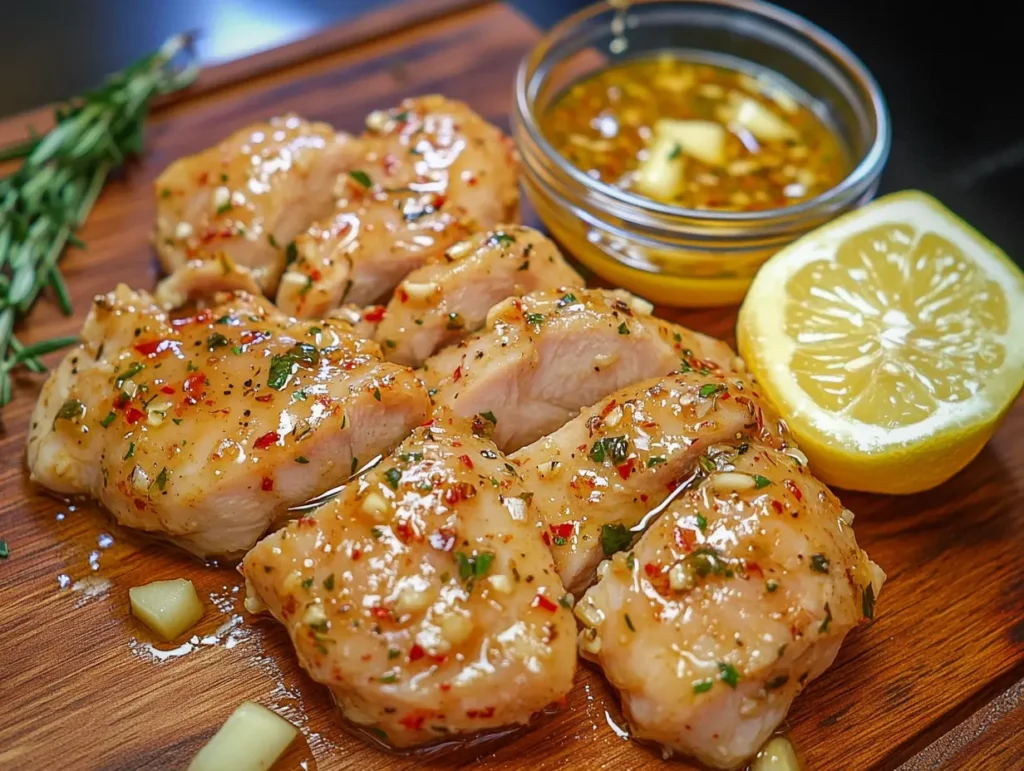Marinating chicken before grilling is a crucial step to ensure flavorful, tender, and juicy results. Understanding why marinate chicken before grilling is important can elevate your cooking skills and help you achieve perfectly grilled chicken every time. This simple technique combines acids, oils, and seasonings to enhance taste, texture, and moisture.
The process involves combining acidic ingredients, oils, and seasonings to create a well-rounded flavor profile and a beautifully caramelized crust. To explore the science behind marination, check out the Wikipedia page on marination.
Table of Contents

Why Marinate Chicken Before Grilling?
What is Marinating?
Marinating is the process of soaking food, in this case, chicken, in a seasoned liquid mixture before cooking. It serves three primary purposes:
- Enhancing Flavor: The marinade imparts bold flavors from its ingredients.
- Tenderizing the Meat: Acids break down proteins, making the meat more tender.
- Locking in Moisture: Oils help retain moisture, preventing the chicken from drying out on the grill.
For those seeking a balanced approach to marination, explore the formula for chicken marinade for simple, adaptable recipes.
The Science Behind Marinating Chicken
The effectiveness of marination lies in its ingredients:
1. Acids
Acids like vinegar, citrus juice, and yogurt help tenderize the chicken by breaking down protein structures. However, overexposure to acids can cause the meat’s surface to become mushy.
2. Oils
Oils serve as a carrier for the flavors and lock in moisture. They also prevent the chicken from sticking to the grill.
3. Seasonings
Herbs, spices, garlic, and soy sauce enhance the chicken’s flavor and create a caramelized crust when grilled.
Contrary to popular belief, marinades primarily flavor the surface of the chicken rather than deeply penetrating the meat. For an alternative approach, check out San Antonio Grilled Red Pepper Chicken Marinade for a tangy and smoky option.
Why Marinate Chicken Before Grilling?
Why Marinate Chicken Before Grilling?
1. Enhances Flavor
Marinades are an excellent way to infuse flavor into chicken. Ingredients like garlic, ginger, and paprika create a bold taste that complements the smokiness of grilling.
2. Tenderizes the Meat
Acids in the marinade break down the tough protein fibers in chicken, making it softer and more tender. This is especially useful for cuts like chicken thighs and drumsticks.
3. Locks in Moisture
The oil in the marinade helps form a protective barrier, keeping the chicken juicy even when exposed to high grilling temperatures.
4. Creates a Caramelized Crust
Sugars in ingredients like honey or brown sugar caramelize when exposed to heat, creating a flavorful and visually appealing crust.
Why Marinate Chicken Before Grilling?
Common Ingredients in Chicken Marinades
A successful chicken marinade includes a balance of three key components:
Acidic Components
- Lemon juice
- Vinegar
- Yogurt
Oils
- Olive oil
- Sesame oil
- Vegetable oil
Seasonings
- Garlic
- Ginger
- Paprika
- Soy sauce
Sweeteners
- Brown sugar
- Honey
- Agave syrup
For inspiration, explore what is Mexican marinade made of to incorporate vibrant spices and flavors into your chicken marinades.
Why Marinate Chicken Before Grilling?
How to Marinate Chicken Correctly
Step-by-Step Process
- Choose Ingredients: Select a balance of acids, oils, and seasonings based on your flavor preference.
- Prepare the Marinade: Whisk all the ingredients together in a bowl or jar.
- Coat the Chicken: Place the chicken in a resealable bag or glass container and pour the marinade over it.
- Refrigerate: Let the chicken marinate in the refrigerator for the recommended time.
Recommended Marinating Times
- Chicken breasts: 2–4 hours
- Thighs and drumsticks: 4–8 hours
- Whole chicken: Up to 24 hours
Best Practices
- Use glass or plastic containers to avoid chemical reactions with acids.
- Avoid over-marinating, as it can lead to mushy textures.
For additional tips, learn how Mexican restaurants achieve perfectly tender chicken.
Why Marinate Chicken Before Grilling?
Alternatives to Marinating
If you’re short on time or looking for a different approach, consider these alternatives:
Dry Rubs
- A mixture of spices and herbs applied directly to the chicken.
- Creates a flavorful crust when grilled.
Brining
- Soak the chicken in a saltwater solution to enhance juiciness and flavor.
Reverse Marination
- Pour a flavorful sauce over cooked chicken for an extra flavor boost.
Popular Marinades for Grilled Chicken
1. Asian Marinade
- Soy sauce, sesame oil, ginger, garlic, and honey.
2. Mediterranean Marinade
- Olive oil, lemon juice, oregano, garlic, and thyme.
3. BBQ Marinade
- Ketchup, Worcestershire sauce, brown sugar, and paprika.
4. Mexican Marinade
- Lime juice, chili powder, cumin, and cilantro. For more on Mexican flavors, check out San Antonio Grilled Red Pepper Chicken Marinade.
FAQs About Marinating Chicken
1. Why is marinating important before grilling?
Marinating adds flavor, tenderizes the meat, and locks in moisture.
2. How long should I marinate chicken before grilling?
It depends on the cut, ranging from 2–24 hours.
3. Can I reuse marinade?
Only if it’s been boiled to kill bacteria.
4. What happens if I over-marinate chicken?
The meat can become mushy due to over-tenderization.
5. What’s the difference between marinating and brining?
Marinades focus on flavor, while brines enhance moisture and saltiness.
Why Marinate Chicken Before Grilling?
Tips for Grilling Marinated Chicken
- Preheat the Grill: Ensures even cooking and prevents sticking.
- Pat the Chicken Dry: Removes excess marinade to avoid flare-ups.
- Brush with Marinade While Cooking: Adds flavor and helps create a caramelized crust.
For more grilling techniques, explore how to sauce wings while keeping them crispy.
Why Marinate Chicken Before Grilling?
Conclusion
Marinating chicken before grilling is an essential technique for achieving flavorful, tender, and juicy results. Whether you prefer bold, spicy flavors or a subtle herbaceous profile, the right marinade can elevate your cooking. Experiment with different ingredients and techniques to discover your favorite combinations. For more inspiration, check out the formula for chicken marinade and other helpful resources.
Why Marinate Chicken Before Grilling?
